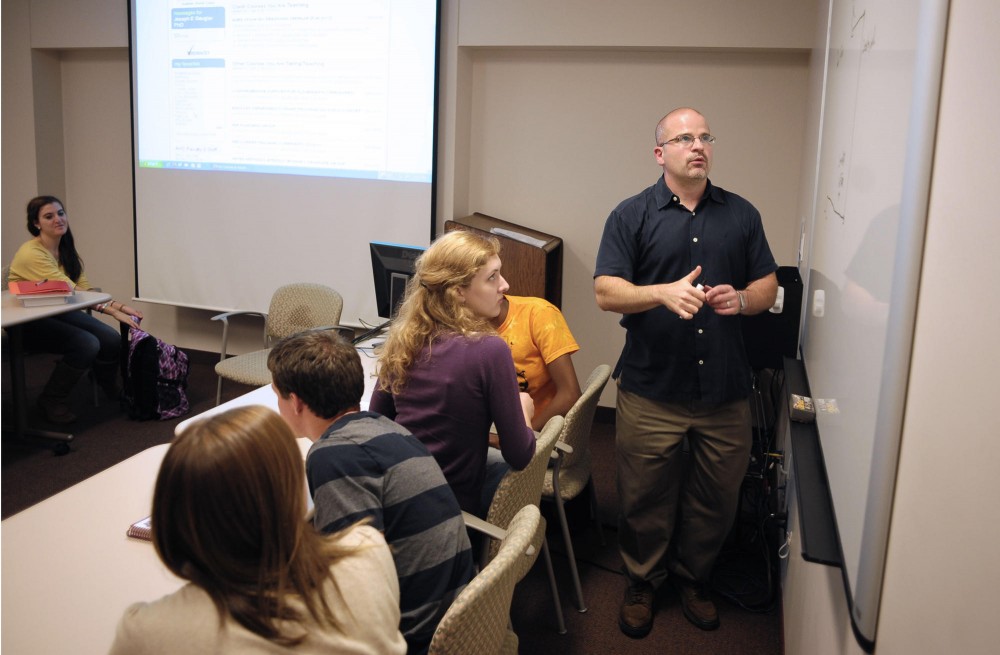Danielle Bielke was on the waitlist two weeks before getting into the new School of Nursing seminar âÄî the only one of its kind available to freshmen who want to become part of the University of MinnesotaâÄôs Academic Health Center.
The course, which began Tuesday, focuses on chronic diseases like diabetes and cancer and is open to students in any major. For students interested in the UniversityâÄôs competitive nursing program âÄî which admits about 130 of 500 applicants each year, according to the admissions director âÄî this is a chance to check it out, no strings attached.
Bielke, who plans to apply there next semester, said the class was one of only two nursing-related courses open to freshmen. The other came from the College of Liberal Arts.
The majority of health science programs at the University offer graduate or professional degrees, but colleges inside and beyond the AHC are beginning to provide ways for freshmen to explore health-related subjects. CLA debuts a new public health minor this fall and the College of Pharmacy has its first freshman seminar in the spring.
Associate professor Joe Gaugler, who created and teaches the new nursing class, said he doesnâÄôt understand why more health science courses arenâÄôt offered to freshmen.
âÄúMy feeling is that itâÄôs better to plant that seed as early as possible,âÄù he said.
Resources like information sessions, tours and online classes exist, particularly through the Health Careers Center, for students interested in health-related careers.
Tricia Todd, the centerâÄôs assistant director, said students from an array of disciplines take online exploratory courses the HCC offers.
She said that while itâÄôs important that undergraduate students have a sound basis for deciding on a professional program in a health field, the schools also want people with diverse interests. The 200 students entering the medical school came with 43 different majors, Todd said.
Less than 10 percent of students in the AHC are undergraduates, and three of the six AHC schools have undergraduate programs. The nursing school, which is the largest, has 381 students.
Undergraduate students often find out about the School of Public Health indirectly, said Maggie Aftahi, recruitment coordinator for the school. For example, an âÄúAlcohol in CollegeâÄù course geared toward freshman introduces many public health issues. She added that a number of students also incorporate public health courses into their bachelor of individualized studies, a create-your-own major program at the University.
Charles Taylor, the senior associate dean for the College of Pharmacy, said the school doesnâÄôt offer any majors or minors for undergraduates, but might in the future.
For now, like other health science departments, the pharmacy school offers online electives about medications.
âÄúEach health profession wants to help raise the elevation of health literacy across the community. We also want to help people come into a health profession if theyâÄôre interested,âÄù Taylor said.
But according to its accreditation standards, which apply to pharmacy schools nationally, the college can only offer one degree: doctorate of pharmacy. A bachelorâÄôs degree in pharmacy simply isnâÄôt a possibility, Taylor said.
One reason is that at such a large school, other colleges offer majors that work well for students who want to be pharmacists, he said.
The College of Pharmacy just approved its first freshman seminar for spring called, âÄúA pill for every problem or problem pills?âÄù Taylor said. He said more classes might be added in the future.
âÄúBut what I personally would like to see is being able to connect better with freshmen âÄî to help them if theyâÄôre interested to explore a career in pharmacy, because we really need them.âÄù


